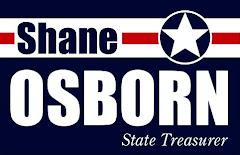
18 March 2009
Are You Going to the Omaha Tea Party?
13 March 2009
Nebraska grabs national attention again
Just wanted to pass this along to everyone.
A few weeks ago the DC Examiner interviewed me regarding my transparency website, NebraskaSpending.com. There has been a huge push over the last few years for more states to start creating similar state spending websites but unfortunately legislators are resisting due to their perception that such a project would cost millions of dollars.
That's why NebraskaSpending.com has become so popular to the taxpayer advocacy groups: we built it for only $38,000. Showing receipts to taxpayers does not have to be a pricey venture.
Enjoy the article.
Putting ‘service’ back in public office
Virginia legislators who reportedly are laying out “seven figures” to put state spending online, should have paid attention when Nebraska state treasurer Shane Osborn wrote recently to say he could do it for much less. After all, he’d already done it for Nebraska. But to date the Virginia solons have not taken up the Nebraskan’s offer.
Osborn is a former Navy pilot whose plane crashed in 2001 after colliding with a Chinese fighter jet in international air space. The near-death experience, for which he received the Distinguished Flying Cross, clarified things for him, and when Osborn retired from the Navy he had a new mission: Put the “service” back in public office.
In the first year of his first term as Nebraska state treasurer (after defeating his own party’s incumbent), Osborn posted the entire state budget online. Nebraskaspending.com is searchable, user-friendly and interactive. It clearly explains where Nebraska’s $6.8 billion in revenue comes from (56.3 percent from state taxes, 32.4 percent from the federal government), how it’s spent, and lists all contracts signed in 2007 - including agencies, contract dates, vendors, description of services, and exactly how much Nebraskans are paying for them. The website so far has had over 600,000 unique visitors who spend 18 minutes on average keeping tabs on their elected officials. Next, he’s planning to add city, public school, and state university budgets to the mix.
Osborn didn’t beg the legislature for funds or spend millions of tax dollars, either. “I used my own staff to compile the data,” he told The Examiner. “We worked with other agencies and just hunted it down.” The total cost: $38,000 – most of it going to a local web designer. A state IT grant provided $25,000 and Osborn took the remaining $13,000 from his own budget. “I just viewed it as my job,” he said. “Citizens have a right to know who the state does business with.”
Osborn isn’t just about making state spending transparent. He has also hired a collection agency to find owners of unclaimed property in Nebraska. In the program’s first year, Osborn returned an unprecedented $12 million – in amounts ranging from $900 to $600,000 – to more than a million surprised and grateful people. He’s now spearheading a national pilot project to digitize unclaimed property records so they can be available online. Can this guy be cloned?
12 March 2009
Middle East Seminar: Day 3
"If the United States is supposed to be the global example of Democracy and be responsible for overseeing our elections, how then is your country unable to determine the outcome of your own President?"
